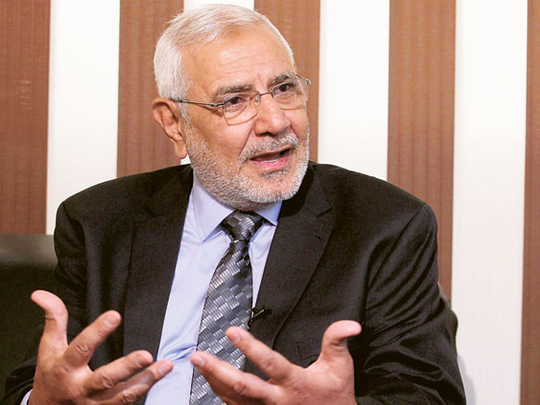
Dubai: He is among the front- runners, and his chances of winning the presidential elections seem good.
Abdul Moneim Abu Al Fotouh, according to some polls, comes top of the list of front-runners. Some influential political parties at present, including the Salafist bloc, threw its weight behind the candidacy of the former senior member of the Muslim Brotherhood, who says he feels proud of his "moderate" Islamist views.
His Islamist background, he told Gulf News in a previous interview, is not expected to constitute an obstacle for him in the presidential race.
"No. On the contrary," he said, when asked whether his long-time affiliation with the Brotherhood will stop many voters from supporting him. "I feel proud of my Islamic background, and I believe my programme and views demonstrate the moderate, enlightened, and progressive Islamist trend, a trend which respects human rights, seeks its advancement, facing the (attempts) to marginalise the status of women in our Arab region, and stresses that citizenship is the basis for duties and responsibilities."
Born in Cairo in October 1951, Abu Al Fotouh studied Medicine and graduated with honours from Cairo University in 1976. One of the high points in his academic life was his debate with late Egyptian president Anwar Sadat when he visited the campus in 1975.
Abu Al Fotouh was then the president of the student union at Cairo University and described Sadat's close followers as "hypocrites", citing the arrests of student demonstrators on campus and the restrictions on the speeches of the influential Islamic scholar Shaikh Mohammad Saeed Al Gazali. He angered Sadat, who ordered Abu Al Fotouh to stop in the middle of the debate. Recently this episode has been posted on the internet.
Formal association
Abu Al Fotouh, who is currently the Secretary-General of the Arab Medical Union, became formally affiliated with the Brotherhood from early 1970s till last year, when he cut off all his political links with the group, following his decision to run for presidential elections — a move that was then against the group's policy.
Muslim Brotherhood has now announced it will field a candidate in the first elections after the ousting of former Egyptian president Hosni Mubarak.
Most of Egyptian voters, meanwhile, has not decided on whom — among the 13 eligible contenders — their final ballot will go.
According to a poll that was published late April in Cairo, nearly 54 per cent of the 2,129 people surveyed said they were still undecided. But for those who had made up their mind among those surveyed, Abu Al Fotouh led the candidate list with 15.5 per cent, followed by former Arab League Secretary-General Amr Mousa with 12.5 per cent. Mohammad Morsi, the Muslim Brotherhood candidate came fifth on the list with 1.5 per cent.
Abu Al Fotouh received considerable support when the Salafist group of the Al Nour party, the second largest bloc in parliament, announced on Saturday their backing for Abu Al Fotouh.
The Salafists, however, have little political experience. They fear that Brotherhood control of both parliament and the presidency would marginalise them, noted press reports.
"The Brotherhood have the best [political] programme . . . but there are dangers when one group controls all the levers of power," Yasser Brohami, a senior cleric from the Salafist was quoted as saying by the Financial Times. Al Wasat Party, also announced on Sunday its backing for Abu Al Fotouh.
Egyptian media quoted a statement by the party as saying the decision of the moderate Islamist party was taken after 63 per cent of the members voted with the move, while 23 per cent voted for the other Islamic intellectual and judicial expert Salim Al Awa. Abu Al Fotouh expressed his confidence that he will win in the first round.
However, his statement raised different reactions among the Egyptians on the internet, ranging from describing it "unjustified arrogance" to "warning him of overconfidence" to "wishing him the best". Some Egyptians also warned of his Islamic background and said he is hiding his "extremism".
Abu Al Fotouh, however, said the three main trends in the Arab societies, including Egypt — the Islamists, the liberals and the leftists — are all against extremism.
He rejects the notion that an Islamist winning the presidential elections will complicate relations with the western powers. He also vehemently rejected the prospect of Islamic-Western tension because of the Islamists' victory in parliamentary elections last year in Egypt and other countries, where their presidents were ousted in the aftermath of what is called the "Arab Spring".
"He who says [of] this [tension] is using the same scarecrow, or playing the same broken record that was used by the ousted dictators which says that Islam affects the relations. Islam and the Islamic trend [are] a genuine trend in the region and can't be ignored."
"On the contrary, a gap was created by ignoring the Islamic civilisation and by making an effort to summarise the [Islamic] civilisation in just some negative phenomena," he added.
Turkish example
Usually, Turkey is the example given by Islamists and Muslim leaders when referring to relations with the west. When the Justice and Development party (AK) headed by the Prime Minister Recep Tayyip Erdogan came to power, Ankara's relations with the West were not affected. The party holds the majority of seats in the National Assembly of Turkey.
AK greatly upgraded the status of Turkey economically, and it "brought back the Turk's dignity. And this is what we are seeking — people with dignity, and not people who fear of speaking out," Abu Al Fotouh said.
Presidential elections will take place on May 23 and 24, and the president will be named on June 21 after a runoff voting round on June 16 and 17.












